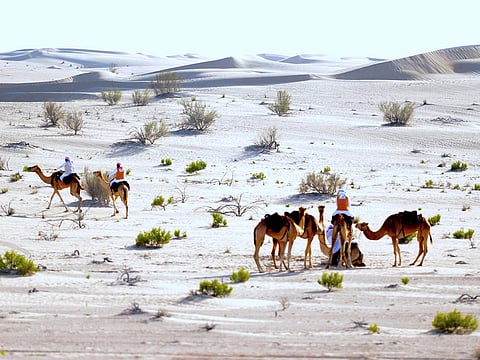Abu Dhabi updates hunting law; here are the dos and don’ts
Hunters must be Emirati, aged at least 18 years, and carry permits with them

Also In This Package
Abu Dhabi: Abu Dhabi will no longer charge hunters a species conservation fee, the emirate’s Executive Council announced on Monday.
The fee was previously charged for hunting animals that had been bred in a breeding facility and released into hunting areas managed by private operators.
Licences and permissions
Instead, the emirate’ environment sector regulator – the Environment Agency Abu Dhabi (EAD) – will issue licenses for traditional hunting permits, as well as specify details for hunting seasons, permitted methods, and others terms and conditions for hunting outside designated areas.
Under this decision, the EAD will outline the species allowed to be hunted by falconers. This includes houbara birds only. Hunting is permitted using falcons licensed and registered with the Ministry of Climate Change and Environment, and proof of their registration must be submitted if requested.
Traditional hunting is restricted to open areas, and falconers must steer clear of prohibited places such as nature reserves, forests, residential, military and petroleum production areas by at least two kilometres. EAD stressed the need for the licensee to abide by the period specified for hunting, with permits issued for one season only. EAD will also start licensing wild hunting for this season, until the end of February 28, 2022.
Prohibitions
It is also prohibited to hunt any kind of wild animal, and cause its disturbance. It is also forbidden to drive vehicles over, and cause damage to, vegetation.
In addition, it is now prohibited to transfer a hunting permit to another person. The permit must be carried while hunting and presented upon request. Anyone who applies for a hunting permit must be Emirati, and aged at least 18 years old.
Aims
The changes to the emirate’s hunting law are part of the amendments to the executive regulation regarding hunting in the emirate, known as Resolution No 69 of 2015 to Law No 22 of 2005. The law is currently enforced by the EAD.
The updates – labelled as Executive Council Decision No 5 of 2021 – aim to preserve the heritage of traditional hunting, especially falconry, and preserve hunting areas while adhering to international standards for environmental diversity. In addition, the EAD will ensure that wild species and biodiversity is maintained even as hunting is kept sustainable.
“This will help in ensuring that this age-old Arab tradition and its values are passed on to the current and future generations, while ensuring respect for the legal and environmental framework. The updates to the law will also emphasise on enhancing the economic value of natural resources by diversifying and enhancing investment opportunities in the environment sector,” the Abu Dhabi Media Office said.
Protecting wildlife resources
The Law No. (22) of 2005, on hunting in the Emirate of Abu Dhabi came to lay down a legal framework for hunting activities. It ensures that hunting is carried out within the environmental controls and standards that are consistent with the efforts to preserve and conserve wild animal species in a sustainable manner. It also contributes to protecting the heritage of falconry, conserving wild animals, preserving hunting areas, and optimising wildlife resources.
At present, the EAD is developing a model for hunting in Abu Dhabi that is benchmarked against international standards and best practices from across the world, including Europe, Africa, the United States, Canada, and other countries in the Arab region.









